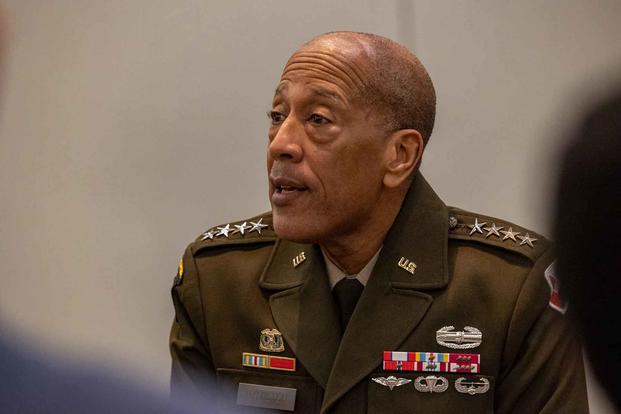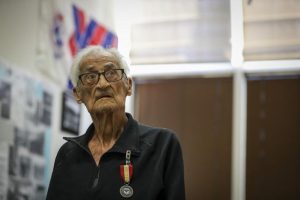One of the Army’s top generals may have abused his authority and subverted the service’s process for selecting senior leadership in what some officials have described to Military.com as a conspiracy to prop up a subordinate officer who was deemed unfit for command.
A Military.com investigation found that Gen. Charles Hamilton, who oversees Army Materiel Command, spent about a month last year trying to pull strings behind the scenes for a female lieutenant colonel to breeze through the service’s Battalion Commander Assessment Program, or BCAP. This included directly lobbying at least three generals on the assessment panel and successfully pushing officials to let the lieutenant colonel get a second board two days after she failed the first.
The interference became so egregious that the director of the Army Command Assessment Program, Col. Robert O’Brien, penned a memo chronicling Hamilton’s conduct on Nov. 1, immediately after the lieutenant colonel was deemed unfit twice in two assessment panels within 48 hours.
Read Next: Watchdog Warnings of VA Employees with Criminal Backgrounds Prompt Key Senator to Push for Fixes
“This was a pressure campaign. [Hamilton] has a lot of influence; this violated the integrity of how the best officers are selected to run units,” one general with direct knowledge of the situation told Military.com on the condition of anonymity to avoid retaliation. “This was abnormal; it was unprofessional. He should have known better.”
O’Brien’s memo on the incidents did not characterize Hamilton’s conduct, but painted a clear picture that the seasoned four-star commander went out of his way to put his thumb on the scale to favor a subordinate who had been judged unfit for command, possibly skirting Army rules. O’Brien did not respond to a request for comment. It’s unclear where he circulated the memo, or whether senior Army leaders read it before Military.com’s inquiry on the matter.
“The Army designed the Command Assessment Program (CAP) to make officer selection for key command assignments as fair and objective as possible,” Col. Randee Farrell, a spokesperson for Army Secretary Christine Wormuth, told Military.com in a statement. “We are reviewing these events and will take appropriate actions to ensure the integrity of the CAP process.”
Hamilton declined to respond to multiple requests for comment.
Starting in at least October, Hamilton on multiple occasions asked officials overseeing BCAP whether he could review the peer and subordinate reports for the lieutenant colonel. Those reports include feedback from soldiers and Army officials who work with officers who are about to be fully assessed at BCAP.
Military.com is withholding the female officer’s name because it found no evidence of wrongdoing on her part.
Hamilton reached out to Mike Arnold, the special adviser to the Army Talent Management Task Force, and O’Brien about the documents, according to several sources with direct knowledge of the situation and the memo. Both of them declined to share those private materials with Hamilton.
The lieutenant colonel’s first assessment panel was on Oct. 30 and was monitored by Hamilton. Monitoring the assessment panel is technically allowed, multiple Army officials familiar with the process explained to Military.com, but is abnormal.
By a vote of 0-5, the five panel members voted the lieutenant colonel as being uncertified for command, citing “counterproductive leadership.”
Psychologists are involved in the process to assess the officer’s mental state. After the first failure, Hamilton took issue with the psychologist’s remarks about the lieutenant colonel, saying they were “too negative” and could have biased the panel, according to O’Brien’s memo. However, the memo and sources familiar with the panel did not point to any specifics that Hamilton took issue with.
Hamilton immediately asked for the lieutenant colonel to be re-paneled, effectively getting another chance — an unheard-of move, according to some Army officials familiar with the process. Officers who fail typically have to wait a year to try again.
O’Brien granted the repanel “solely based” on Hamilton’s request, according to his own memo. However, Col. Townley Hedrick, chief of staff of the Command Assessment Program, told the lieutenant colonel she was being re-paneled due to “technical issues,” the memo added.
It’s unclear what technical issues would warrant a redo of an assessment panel. The next day, Hamilton called Hedrick, thanking him for “playing a part” in re-paneling the lieutenant colonel.
Between the first panel and the redo, Hamilton called three different panel members — Maj. Gens. Jeth Rey, Trevor Bredenkamp and Hope Rampy — to discuss the lieutenant colonel, multiple sources with direct knowledge of the situation told Military.com. Panelists are supposed to be anonymous to avoid lobbying, one Army official explained, and are often finalized just hours before a panel as a safeguard.
Throughout the morning of the second panel, Hamilton repeatedly sent text messages and called senior assessment staff, including Hedrick and O’Brien, asking about interview results, O’Brien explained in his memo.
At noon, the second panel was complete. The lieutenant colonel was again found unfit for command, but this time in a 2-3 vote, according to a source with direct knowledge of the situation. She was found to have “ineffective” and “counterproductive” leadership qualities.
Hamilton inquired about the results several additional times throughout the day until after 9 p.m. It’s unclear when, if ever, the results were formally shared with him.
In January, the lieutenant colonel’s name was included on a command selection list — strongly suggesting she will take command of a unit soon. It’s unclear whether she managed to get on a third panel and finally passed or skirted what Army senior leaders have long touted as a filtering process to weed out bad leaders.
Related: Two Commanders in Marine Corps’ West Coast Infantry School Fired on Same Day
Story Continues
Please rate this CIBA article
Vote






